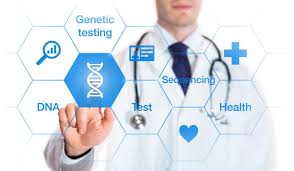AI and the Future of Healthcare: A New Era Begins

Artificial Intelligence (AI) is revolutionizing various industries, and healthcare is at the forefront of this transformation. From improving diagnostics to streamlining administrative tasks, AI is reshaping how we approach patient care. Here's a look at the key benefits of AI in healthcare.
1. Improved Diagnosis and Early Detection
AI algorithms can analyze medical images such as X-rays, CT scans, and MRIs with impressive accuracy. This helps doctors detect conditions like cancer, brain injuries, and fractures much earlier.
Predictive analytics powered by AI can also identify individuals at risk of developing chronic diseases before symptoms appear—leading to better prevention and early treatment.
2. Personalized Treatment Plans
AI can customize treatment plans based on a patient's genetic makeup, medical history, and lifestyle. This leads to more effective care, fewer side effects, and faster recovery.
It can also guess how someone will react to a certain medicine, helping doctors choose safer and more effective treatments
3. Better Operational Efficiency
Hospitals and clinics face administrative overload. AI helps by automating tasks like:
- Appointment scheduling
- Medical billing
- Patient data entry
This frees up time for healthcare professionals to focus more on patients rather than paperwork.
Traditional drug development can take years and cost billions.AI speeds up this work by studying data to see how new medicines might work, helping scientists find useful discoveries more quickly and at a lower cost.
5. Virtual Health Assistants
AI-powered chatbots and virtual nurses are available 24/7 to:
- Answer patient questions
- Provide health reminders
- Offer symptom checks
These tools are very helpful for people with long-term health issues or who need help often
6. Enhanced Medical Imaging
AI assists radiologists in spotting abnormalities that are often difficult to see with the human eye. This results in:
- Faster health problem detection
- More careful results
- Fewer missed conditions
It integrates directly into existing imaging systems, streamlining the diagnostic process.
7. Remote Monitoring & Patient Engagement
With AI-enabled wearables and apps, patients can monitor their health in real-time. These tools:
- Track vitals like heart rate and blood sugar
- Alert doctors if something’s off
- Encourage patients to stay engaged with their own care.
8. Smarter Research & Public Health
AI can analyze massive datasets to detect trends, predict outbreaks, and improve healthcare policies. It's helping researchers and governments .
Final Thoughts
AI in healthcare isn’t just a trend—it’s a revolution. From improving patient outcomes to transforming hospital operations, the impact is already visible and growing rapidly.
As AI keeps improving, we will see even more new and better ways to give healthcare. The future of medicine will be smarter, quicker, and more focused on each person’s needs.
Articles
Build your awareness and get inspired with our researched articles on how you can strengthen your well-being
Contact Us
-
InspireWebApp
-
support@inspirewebapp.com
-
7600 Georgia Avenue Northwest, Washington, DC 20012, USA
Streamline Your Workflow with Inspire — Subscribe Now!
Join hundreds of healthcare professionals who trust Inspire to manage their documentation faster and more accurately.
Key Benefits
- ✅ Instant access to all tools
- ✅ Secure & HIPAA-compliant
- ✅ Designed for health Care providers
Popular Articles

Top AI Tools in Healthcare (2025): Transforming Clinics Across the USA
By Zukane Mbuih

Top AI Software for Clinics in 2025: Why Inspire Web APP Is Leading the Future
By Zukane Mbuih
13 Steps of Revenue Cycle Management: A Complete Guide for Healthcare
By Zukane Mbuih
Medical Artificial Intelligence: Bill Gates, Duty to Warn & Groundbreaking Benefits
By Zukane Mbuih